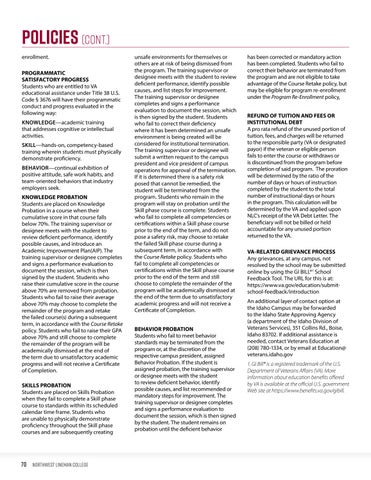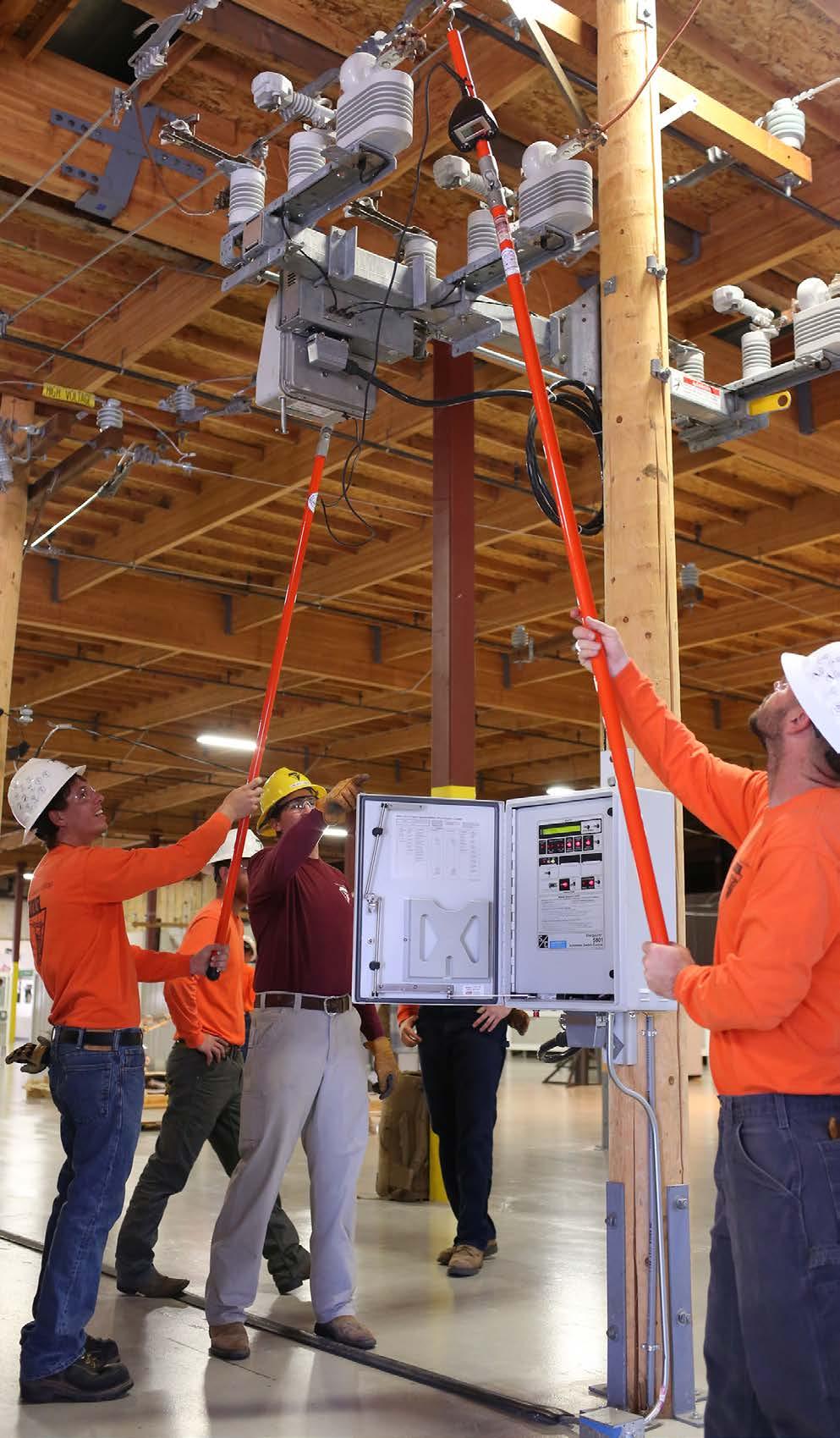POLICIES (cont.) enrollment. PROGRAMMATIC SATISFACTORY PROGRESS Students who are entitled to VA educational assistance under Title 38 U.S. Code § 3676 will have their programmatic conduct and progress evaluated in the following way: KNOWLEDGE—academic training that addresses cognitive or intellectual activities. SKILL—hands-on, competency-based training wherein students must physically demonstrate proficiency. BEHAVIOR—continual exhibition of positive attitude, safe work habits, and team-oriented behaviors that industry employers seek. KNOWLEDGE PROBATION Students are placed on Knowledge Probation in a course when their cumulative score in that course falls below 70%. The training supervisor or designee meets with the student to review deficient performance, identify possible causes, and introduce an Academic Improvement Plan(AIP). The training supervisor or designee completes and signs a performance evaluation to document the session, which is then signed by the student. Students who raise their cumulative score in the course above 70% are removed from probation. Students who fail to raise their average above 70% may choose to complete the remainder of the program and retake the failed course(s) during a subsequent term, in accordance with the Course Retake policy. Students who fail to raise their GPA above 70% and still choose to complete the remainder of the program will be academically dismissed at the end of the term due to unsatisfactory academic progress and will not receive a Certificate of Completion. SKILLS PROBATION Students are placed on Skills Probation when they fail to complete a Skill phase course to standards within its scheduled calendar time frame. Students who are unable to physically demonstrate proficiency throughout the Skill phase courses and are subsequently creating
70 NORTHWEST LINEMAN COLLEGE
unsafe environments for themselves or others are at risk of being dismissed from the program. The training supervisor or designee meets with the student to review deficient performance, identify possible causes, and list steps for improvement. The training supervisor or designee completes and signs a performance evaluation to document the session, which is then signed by the student. Students who fail to correct their deficiency where it has been determined an unsafe environment is being created will be considered for institutional termination. The training supervisor or designee will submit a written request to the campus president and vice president of campus operations for approval of the termination. If it is determined there is a safety risk posed that cannot be remedied, the student will be terminated from the program. Students who remain in the program will stay on probation until the Skill phase course is complete. Students who fail to complete all competencies or certifications within a Skill phase course prior to the end of the term, and do not pose a safety risk, may choose to retake the failed Skill phase course during a subsequent term, in accordance with the Course Retake policy. Students who fail to complete all competencies or certifications within the Skill phase course prior to the end of the term and still choose to complete the remainder of the program will be academically dismissed at the end of the term due to unsatisfactory academic progress and will not receive a Certificate of Completion. BEHAVIOR PROBATION Students who fail to meet behavior standards may be terminated from the program or, at the discretion of the respective campus president, assigned Behavior Probation. If the student is assigned probation, the training supervisor or designee meets with the student to review deficient behavior, identify possible causes, and list recommended or mandatory steps for improvement. The training supervisor or designee completes and signs a performance evaluation to document the session, which is then signed by the student. The student remains on probation until the deficient behavior
has been corrected or mandatory action has been completed. Students who fail to correct their behavior are terminated from the program and are not eligible to take advantage of the Course Retake policy, but may be eligible for program re-enrollment under the Program Re-Enrollment policy, REFUND OF TUITION AND FEES OR INSTITUTIONAL DEBT A pro rata refund of the unused portion of tuition, fees, and charges will be returned to the responsible party (VA or designated payor) if the veteran or eligible person fails to enter the course or withdraws or is discontinued from the program before completion of said program. The proration will be determined by the ratio of the number of days or hours of instruction completed by the student to the total number of instructional days or hours in the program. This calculation will be determined by the VA and applied upon NLC’s receipt of the VA Debt Letter. The beneficiary will not be billed or held accountable for any unused portion returned to the VA. VA-RELATED GRIEVANCE PROCESS Any grievances, at any campus, not resolved by the school may be submitted online by using the GI BILL®1 School Feedback Tool. The URL for this is at: https://www.va.gov/education/submitschool-feedback/introduction An additional layer of contact option at the Idaho Campus may be forwarded to the Idaho State Approving Agency (a department of the Idaho Division of Veterans Services), 351 Collins Rd., Boise, Idaho 83702. If additional assistance is needed, contact Veterans Education at (208) 780-1334, or by email at Education@ veterans.idaho.gov 1. GI Bill® is a registered trademark of the U.S. Department of Veterans Affairs (VA). More information about education benefits offered by VA is available at the official U.S. government Web site at https://www.benefits.va.gov/gibill.

















